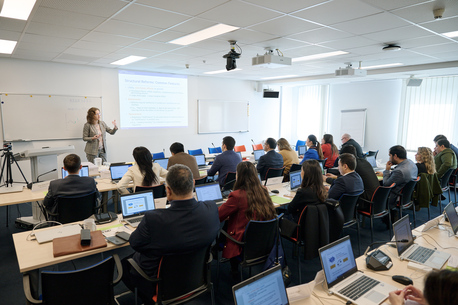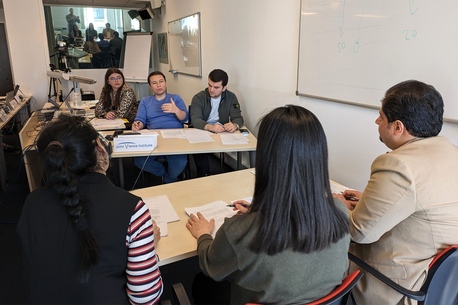- English | Русский



Now in its 12th edition, the Structural Reforms course continues to evolve, reflecting the shifting global policy landscape and the growing demand for tailored reform strategies. Held in person at the JVI from March 10-21, the 2025 edition welcomed 27 participants from 16 countries. While many participants came from ministries of finance and central banks, the course also included representatives from agencies and ministries focused on innovation, digital technologies, communications, science, regional development and infrastructure—fostering dynamic, cross-sectoral discussions grounded in practical experience.
Structural reforms lie at the core of policymaking, particularly at a time when fiscal and monetary policy space is increasingly constrained. They are critical to raising productivity, enhancing competitiveness, and boosting potential growth, which are vital for improving the well-being of the population. The course equips participants with a range of analytical tools, from identifying reform gaps to developing stakeholder maps. It also offers numerous practical insights through case studies, a negotiation game, and applied exercises, to support the design and implementation of effective reform strategies.
The program continues to benefit from the expertise of JVI staff and key partners—the IMF, World Bank, WTO, OECD, ILO, EBRD, EIB, International Institute for Applied Systems Analysis (IIASA), the Austrian Parliament, and Austrian National Bank (OeNB)—whose contributions provide both policy depth and operational relevance. In addition to its core modules—covering labor markets, pension systems, financial markets, governance, infrastructure, external trade, and SME finance—the course also explores the role of the state in the economy, industrial policy, the implications of artificial intelligence for economic structure, and the social costs of reform. Sessions on political economy dynamics and reform sequencing offered valuable perspectives on implementation challenges and trade-offs.
A hallmark of the course remains its interactive workshops, in which participants work in teams to develop reform agendas and implementation strategies for three country case studies. These sessions foster collaboration and peer learning, allowing participants to apply theoretical knowledge to practical scenarios and learn from each other’s diverse experiences.
Building on successful innovations from previous years, the course again featured hybrid delivery for selected sessions, allowing access to a wider pool of international experts while supporting the JVI’s commitment to sustainability by reducing travel-related emissions.
Beyond the classroom, professional and personal connections were facilitated by informal interactions. They ranged from coffee breaks to lunches to organized social activities, such as a group dinner followed by bowling and a collaborative painting session. These moments of exchange remain highly valued aspects of the course.
As structural reform challenges grow more complex and interconnected, the course continues to serve as a unique platform for policymakers to reflect, learn, and build lasting professional ties.
Patrick Imam, Deputy Director, JVI
Tatiana Evdokimova, Senior Economist, JVI